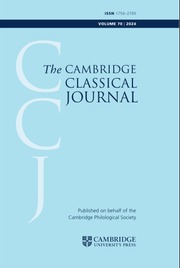No CrossRef data available.
Article contents
Artake and Hylaea in Propertius 1.8.25–6*
Published online by Cambridge University Press: 06 March 2012
Extract
Elegy 1.8 is Propertius' propemptikon for Cynthia, which starts with the poet begging Cynthia not to go off to Illyria with his rival. Once Propertius has abandoned hope of her staying, he modulates into the good wishes for Cynthia's voyage (17–18) which are standard in this genre of content. He himself will continue his elegiac outpourings at her door (21–2), and will accost and interrogate sailors about which sea-port Cynthia has reached on her journey (23–4). Then in lines 25–6 Propertius fantasises about Cynthia settling abroad; he mentions two potential foreign locations – in the MSS they are denoted by Atraciis (25) and Hylaeis (26) – but he remains confident that she will nevertheless be his in the future. In the Teubner edition of Propertius, Paolo Fedeli retained the MSS reading Atraciis (NFL) and the reading Hylaeis implied by the MSS (Hi(y)le(y)is NFL), and he printed the couplet as:
- et dicam ‘Licet Atraciis considat in oris,
- et licet Hylaeis, illa futura mea est.’
- Type
- Research Article
- Information
- Copyright
- Copyright © The Author(s). Published online by Cambridge University Press 2011


